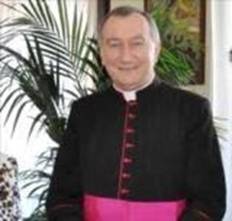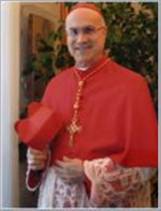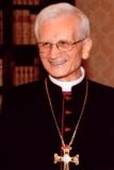september 2013 - abbey
Main menu:
- Home Page
- Abbey
- Apiary
- Documents
- Monastic
- Spirituality
- Apostleship of the Sea
- Homilies of Pope Francis
september 2013
1. Pope appoints Archbishop Pietro Parolin as new Vatican Secretary of State
In the most significant appoint ment of his 5-
ment of his 5-
Archbishop Parolin was born on Jun. 17, 1955 in Schiavon, Italy, and was ordained priest for Vicenza Diocese on Apr. 27, 1980. With a degree in Canon Law, he entered the Holy See’s diplomatic mission in July, 1986, and served in Nigeria, Mexico and in the Section for Relations with States of the Vatican Secretariat of State, where he was appointed Undersecretary on Nov. 30, 2002. On Aug. 17, 2009, he was appointed Apostolic Nuncio to Venezuela as well as archbishop. Pope Benedict XVI consecrated him bishop on Sept. 12, 2009. Archbishop Pietro Parolin speaks French, English and Spanish besides his native Italian.
Although the pope is the head of Vatican City State, the Secretary of State generally functions as the Vatican’s head of government, both for internal church affairs and for diplomatic relations, making him, effectively, the prime minister. Along with the appointment of Archbishop Pietro Parolin, Pope Francis has confirmed several others at the Secretariat of State in their respective posts. They are Archbishop Giovanni Angelo Becciu, the Substitute for General Affairs; Archbishop Dominique Mamberti, the Secretary for Relations with States; Archbishop Georg Gänswein, the Prefect of the Pontifical Household, Msgr. Peter Wells, the Assessor for General Affairs; and Msgr. Antoine Camilleri, Under-
2. Pope Francis at Angelus: Sept 7 day of prayer for peace
Below is the full text of the Pope’s peace appeal during Sunday’s ‘Angelus’ prayer:
Hello! Today, dear brothers and sisters,
I wish to make add my voice to the cry which rises up with increasing anguish from every part of the world, from every people, from the heart of each person, from the one great family which is humanity: it is the cry for peace! It is a cry which declares with force: we want a peaceful world, we want to be men and women of peace, and we want in our society, torn apart by divisions and conflict, that peace break out! War never again! Never again war! Peace is a precious gift, which must be promoted and protected.
There are so many conflicts in this world which cause me great suffering and worry, but in these days my heart is deeply wounded in particular by what is happening in Syria and anguished by the dramatic developments which are looming. I appeal strongly for peace, an appeal which arises from the deep within me. How much suffering, how much devastation, how much pain has the use of arms carried in its wake in that martyred country, especially among civilians and the unarmed! I think of many children will not see the light of the future! With utmost firmness I condemn the use of chemical weapons: I tell you that those terrible images from recent days are burned into my mind and heart. There is a judgment of God and of history upon our actions which are inescapable! Never has the use of violence brought peace in its wake. War begets war, violence begets violence.
With all my strength, I ask each party in this conflict to listen to the voice of their own conscience, not to close themselves in solely on their own interests, but rather to look at each other as brothers and decisively and courageously to follow the path of encounter and negotiation, and so overcome blind conflict. With similar vigour I exhort the international community to make every effort to promote clear proposals for peace in that country without further delay, a peace based on dialogue and negotiation, for the good of the entire Syrian people. May no effort be spared in guaranteeing humanitarian assistance to those wounded by this terrible conflict, in particular those forced to flee and the many refugees in nearby countries. May humanitarian workers, charged with the task of alleviating the sufferings of these people, be granted access so as to provide the necessary aid.
What can we do to make peace in the world? As Pope John said, it pertains to each individual to establish new relationships in human society under the mastery and guidance of justice and love (cf. John XXIII, Pacem in Terris, [11 April 1963]: AAS 55, [1963], 301-
I repeat forcefully: it is neither a culture of confrontation nor a culture of conflict which builds harmony within and between peoples, but rather a culture of encounter and a culture of dialogue; this is the only way to peace. May the plea for peace rise up and touch the heart of everyone so that they may lay down their weapons and be let themselves be led by the desire for peace.
To this end, brothers and sisters, I have decided to proclaim for the whole Church on 7 September next, the vigil of the birth of Mary, Queen of Peace, a day of fasting and prayer for peace in Syria, the Middle East, and throughout the world, and I also invite each person, including our fellow Christians, followers of other religions and all men of good will, to participate, in whatever way they can, in this initiative. On 7 September, in Saint Peter’s Square, here, from 19:00 until 24:00, we will gather in prayer and in a spirit of penance, invoking God’s great gift of peace upon the beloved nation of Syria and upon each situation of conflict and violence around the world. Humanity needs to see these gestures of peace and to hear words of hope and peace! I ask all the local churches, in addition to fasting, that they gather to pray for this intention.
Let us ask Mary to help us to respond to violence, to conflict and to war, with the power of dialogue, reconciliation and love. She is our mother: may she help us to find peace; all of us are her children! Help us, Mary, to overcome this most difficult moment and to dedicate ourselves each day to building in every situation an authentic culture of encounter and peace. Mat, Queen of Peace, pray for us!
3. Pope’s condolence on death of Zambia’s first cardinal
 Pope Francis expressed deep sadness on Friday August 30, on hearing about the death of Zambia first Cardinal, Medardo Joseph Mazombwe. The 81-
Pope Francis expressed deep sadness on Friday August 30, on hearing about the death of Zambia first Cardinal, Medardo Joseph Mazombwe. The 81-
Cardinal Mazombwe was formerly a member of the Vatican Congregation for the Evangelization of Peoples and of the Pontifical Council “Cor Unum”. Cardinal Mazombwe was born on 24 Sep 1931 at Katete in the Eastern Province of Zambia. He was ordained a priest on 4 September 1960 and became Bishop of Chipata on 7 Feb 1971. Since 1996 he had been the Archbishop of Lusaka until his retirement in 2006. When Pope Benedict XVI made him a cardinal in the consistory of November 30, 2010, Cardinal Mazombwe became Zambia’s first indigenous cardinal. With his death the number of cardinals in the world now stands at 201, of whom 112 are below the age of 80 and hence are eligible to vote for a new pope in case of a conclave.
4. Pope delegates cardinal to centenary of Tokyo’s Sophia University Pope Francis on Saturday August 31, appointed Italian Cardinal Raffaele Farina as his special representative to the 100 years’ celebration of Japan’s eminent Sophia University in Tokyo, run by the Society of Jesus or Jesuits. The celebration is scheduled for November 1. Preparations for the actual foundation of the university began in 1908, when three Jesuit priests arrived in Japan in response to a request from Pope Pius X. Five years later, in 1913, they opened the first Catholic university in Japan on the site called Kioi, where Sophia still stands. With Fr. Hermann Hoffmann as its first president, the new university included departments of philosophy, German literature, and commerce. The ultimate origin of Sophia University can be traced back to the plans of the Jesuit missionary Francis Xavier, who came to Japan in 1549 to spread Christianity.
Pope Francis on Saturday August 31, appointed Italian Cardinal Raffaele Farina as his special representative to the 100 years’ celebration of Japan’s eminent Sophia University in Tokyo, run by the Society of Jesus or Jesuits. The celebration is scheduled for November 1. Preparations for the actual foundation of the university began in 1908, when three Jesuit priests arrived in Japan in response to a request from Pope Pius X. Five years later, in 1913, they opened the first Catholic university in Japan on the site called Kioi, where Sophia still stands. With Fr. Hermann Hoffmann as its first president, the new university included departments of philosophy, German literature, and commerce. The ultimate origin of Sophia University can be traced back to the plans of the Jesuit missionary Francis Xavier, who came to Japan in 1549 to spread Christianity.
5. Pope sends blessing to “Month of Martyrs” in Seoul
Pope Francis has sent his blessings to the month- In a message sent on the Pope’s behalf to Archbishop Andrew Yeom Soo-
In a message sent on the Pope’s behalf to Archbishop Andrew Yeom Soo-
Cardinal Bertone wrote. “He prays that this occasion may be an opportunity for pilgrims to rekindle the faith in their hearts and so commit themselves more fully to the urgent task of evangelization,” the cardinal wrote. The Korean Martyrs were the victims of religious persecution during the 18th and 19th centuries in Korea, mostly lay people. At least 8,000 Catholics were killed for their faith in the persecutions, 103 of whom were canonized by Pope John Paul II, May 6, 1984, in Seoul.
Seoul's ‘Month of Martyrs’ was inaugurated on Monday, Sept. 2, at Myeongdong Cathedral. The archdiocese has prepared the so-